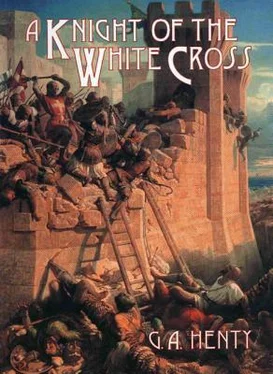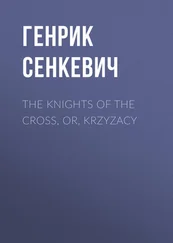Still bearing the anchor, the sailor followed Gervaise into an apartment where D'Aubusson was taking council with some of the senior knights.
"Pardon my interrupting your Highness," Gervaise said; "but the matter is so important that I knew you would listen to it, however occupied you were." And he then repeated the narrative of the sailor's discovery.
"This is indeed of the highest importance," D'Aubusson said, "and the knowledge that it gives us may enable us to defeat an attempt, that might otherwise have proved our ruin. You see, knights, it solves the question that we were just discussing. We agreed that this long floating bridge that they have been constructing, was intended to enable them to cross the outer port and again attack St. Nicholas; and yet it seemed to us that even by night our batteries would be able to keep up such a fire on the boats, towing the head of the bridge across, as to render it well nigh impossible for them to get it over. Now you see what their plan is. With the aid of this rope, the end of which they think is firmly fixed on our side, they mean to haul the bridge across, and that so silently that they hope to be upon us almost before we have time to don our armour. We shall now be fully prepared, and need have no fear of the result."
There could now be little doubt that the attack would be made without loss of time, especially as the Turks believed that they could get their bridge across unseen. The fire ships — which were altogether more formidable than those Gervaise had improvised — were ordered to be made ready for action. This being arranged, the admiral left the council at once, that no time should be lost in getting them in readiness. D'Aubusson then turned to the English sailor.
"You have rendered us a great service indeed by your vigilance, and showed great prudence by allowing the Turk to believe that he had accomplished his mission unsuspected. Had he thought he had been observed, some other plan would have been adopted. For so great a service it is meet that a great reward should be given."
He then took a bag from the hands of one of his secretaries, whom he had sent to fetch it, while they were discussing the matter of the fire ships.
"Here are two hundred golden crowns," he added, handing the bag to the seaman. "With these you can either settle on shore, or can build a stout ship and pursue your calling. Should you do so, call her the St. Nicholas, in remembrance of the gratitude of the Order of St. John for your having saved that fort from the Turks."
Astonished and delighted at the reward, which represented a very large sum in those days, the sailor stammered his thanks, and added, "I hope tonight that if I again have charge of a fire ship, I may be able to do more to prove to your Highness how grateful I am for the gift."
Throughout the day preparations for the defence of St. Nicholas went on unceasingly. Gangs of men, as usual, worked in the breach; but, as it was deemed advisable that there should be no outward show of activity that would lead the Turks to suspect that their design had been discovered, neither reinforcements of men nor munitions were sent along the mole; everything being taken out by boats, which, rowing closely along under the wall, were hidden from the view of the Turks. Barrels of Greek fire and pitch, cauldrons for heating the latter, a store of firewood, great balls of cotton steeped in oil and turpentine, sheaves of darts, spikes on short staves, that were, after darkness fell, to be thrust in among the fallen masonry to form a chevaux-de-frise — these, and all other matters that the ingenuity of the defenders could suggest, were landed at the water gate of the fort, while the garrison was strengthened by the addition of a large number of knights. Stores of ammunition were collected in readiness at all the batteries that commanded the mouth of the outer port, and by sunset D'Aubusson felt that everything that was possible had been done to meet the impending storm.
At midnight the Turkish preparations were complete. The attack by the bridge was to be assisted by a large number of boats and other craft, and many armed galleys were also brought up to destroy or tow away the defenders' fire ships. Paleologus himself was down by the shore directing the preparations. Some of his best troops were placed upon the floating bridge, and, when all was ready, the order was given to pull upon the rope. No sooner, however, did the strain come upon it than there was a jerk, the rope slackened, and it was at once evident that the anchor had been discovered and the well laid plan disconcerted. Paleologus was furious, but, believing that the attack he had arranged would still be irresistible, he ordered a number of boats to take the bridge in tow, while a still larger force was to make a direct attack upon the breach. The movement was to be conducted as silently as possible until it was discovered, and then a dash forward was to be made.
It was two o'clock before the fresh arrangements were completed and the boats put out. They had gone but a short distance when the anxious watchers in St. Nicholas learnt by the dull, confused sound that came across the water, that the attack was, in spite of the failure of the plan to take the bridge silently across, to be persevered in. A cannon was at once fired to give notice to the other batteries to be in readiness, and as soon as the dark mass of boats was made out the guns of the fort opened a destructive fire upon them, and a moment later were seconded by those from the fortress; these, however, were at present being fired almost at random, as the Turkish boats could not be made out at that distance. Now that all need for concealment was at an end, the Turkish war cry rose shrilly in the air, and the boatmen bent to their oars. The great cannon at St. Anthony's Church hurled their tremendous missiles at the tower, seconded by the fire of a number of other pieces that had in the darkness been brought down almost to the water's edge.
As before, the boats swept up to the foot of the breach, the Turks leaped out, and, undismayed by the storm of shot, climbed up to the assault. The short ladders that they had brought with them enabled them to surmount the escarpments so laboriously made, and with loud shouts of "Allah!" they flung themselves upon the defenders on the crest of the breach. Here they were met by a line even more difficult to break through than before. The knights were ranged three deep; those in the front were armed with swords and battleaxes, while those in the other two lines thrust their spears out between the swordsmen, covering them with a hedge of steel points. Others in the rear brought up buckets of blazing pitch and Greek fire, and, advancing through gaps left for the purpose, hurled the buckets down into the struggling mass on the slope. There the fire not only carried death among the assailants, but the lurid flames enabled the batteries to direct their shot with terrible effect upon the breach, the crowded boats at its foot, and the bridge which was, with immense labour, presently got into position.
It was not long before fresh light was thrown upon the scene, as the fire ships, issuing out from the inner harbour, burst into columns of flame, and, towed by boats, came into action. They were convoyed by the two galleys, each with a full complement of knights, and these soon became engaged in a fierce fight with the Turkish vessels that bore down to arrest the course of the fire ships. The scene was indeed a terrible one, the roar of cannon, the shouts of the combatants, the screams of the poor wretches upon whom the terrible Greek fire fell, the clash of arms and the shouts and cries of the Turks as they pressed across the bridge, united in a din that thrilled with horror the spectators, both in the city and on St. Stephen's Hill.
Several of the Turkish galleys, in their efforts to arrest the approach of the fire ships towards the bridge, became themselves involved in the flames; but they were so far successful that when daylight broke the bridge was still intact and the combat at the breach continued to rage with determination and fury on both sides. The Turks there were led by a brave young prince named Ibrahim, a near relative of the sultan, with whom he was a great favourite, and he was ever in the front line of the assailants, his splendid bravery animating the soldiers to continue their efforts. As the daylight broadened out, however, the light enabled the Christian gunners to aim with far greater accuracy than had before been possible, and, concentrating their fire upon the bridge, across which reinforcements continued to press to the support of the assailants, they succeeded in sinking so many of the boats that it was no longer passable.
Читать дальше












